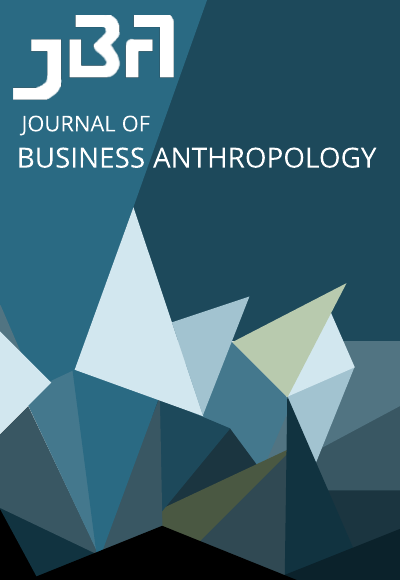Fieldwork in a Hall of Mirrors: An Anthropology <i>of</i> Anthropology <i>in</i> Business
DOI:
https://doi.org/10.22439/jba.v6i1.5319Keywords:
’pure’ and ’applied’ anthropology, human resource management, ethnography, corporate culture, reflexivity, role-ambiguityAbstract
An increasing number of anthropology graduates find employment in business organisations, often as culture experts or consultants drawing on ethnographic methods. In this paper I will use my fieldwork experience in the Human Resource Department of Bang & Olufsen to explore the borders and crossovers between anthropological research and anthropological consultancy. Fieldwork took place among human resource consultants (some of them with an anthropological background) who worked for business, i.e. who used ethnographic methods and worked on identifying, describing and communicating the fundamental corporate values, or, as it were, the ’corporate religion’ of the company. How does it affect research stratagems and methodology when the HR employees are in a clear sense both participants in and observers of their own social reality? Is it at all feasible or possible to maintain a distinction between ethnographer and consultant, participant observers and observing participants? Although the distinction between ethnographer and employee cannot be drawn easily, I want to argue that the fact that it is impossible to maintain a watertight separation does not imply that we should abandon the attempt to make the distinction. Being aware of the similarities and overlaps as well as acknowledging the differences is a crucial part of the anthropological methodology.
Downloads
Published
Issue
Section
License
Authors who publish with this journal agree to the following terms:
- Authors retain copyright and grant the journal right of first publication with the work simultaneously licensed under a Creative Commons Attribution License that allows others to share the work with an acknowledgement of the work's authorship and initial publication in this journal.
- Authors are able to enter into separate, additional contractual arrangements for the non-exclusive distribution of the journal's published version of the work (e.g., post it to an institutional repository or publish it in a book), with an acknowledgement of its initial publication in this journal.
- Authors are permitted and encouraged to post their work online (e.g., in institutional repositories or on their website) prior to and during the submission process, as it can lead to productive exchanges, as well as earlier and greater citation of published work (See The Effect of Open Access).



